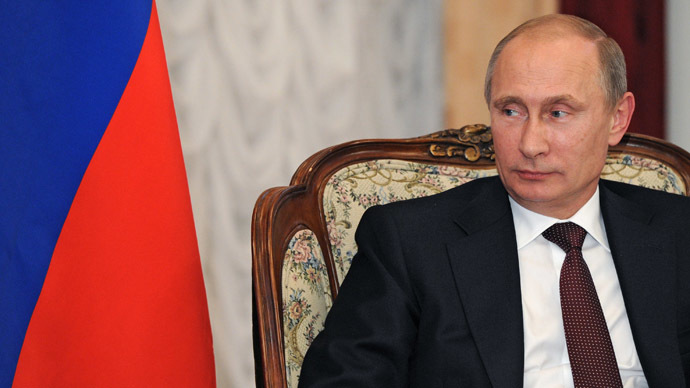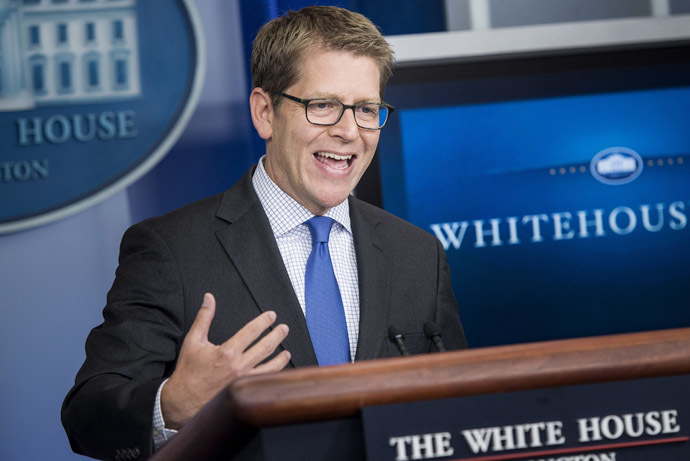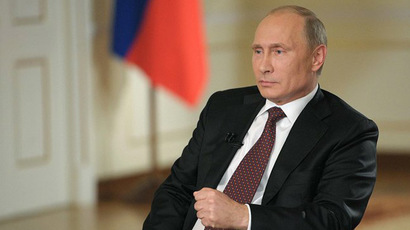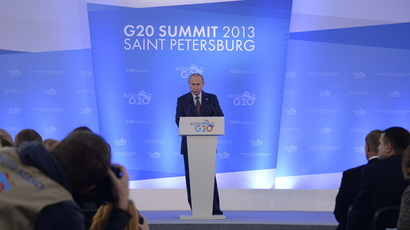‘Unexceptional’ US, Russia scrap over Putin’s NY Times Op-Ed

Russia and the US continue to trade barbs over President Vladimir Putin’s recent Op-Ed in the New York Times, in which he took issue with America viewing itself as “exceptional” and the dangers it posed in Syria and beyond.
On Friday, Putin’s spokesman, Dmitry Peskov, said he was bemused that the United States continued to insist that it occupied an “exceptional” role in the international arena.
“Democracy implies the existence of competition, but at times there is the perception that the US has estranged itself from this competition.”
Peskov insisted that Putin had no intention of pushing a confrontation or offending anyone with his words. He continued that as far as international affairs were concerned, Putin had no interest in wagging his finger at anyone.
"However, our American friends over the last decade have gotten into the habit of giving everyone a patronizing pat on the back, which has served to shape the world’s attitude towards the United States,” he said.
The Kremlin’s reaction came after a tough response from the White House regarding Putin’s Op-Ed on Thursday, saying Russia’s own actions had served to demonstrate how the US is in fact “exceptional.”
"Unlike Russia, the United States stands up for democratic values and human rights in our own country and around the world," White House spokesman Jay Carney said.
Carney said the very fact The New York Times would publish Putin’s column served to demonstrate the US’s commitment to freedom of expression, and "that is not a tradition shared in Russia ... And it is a fact freedom of expression has been on the decrease over the past dozen or so years in Russia."
"It is also worth noting," Carney said, "that Russia is isolated and alone in blaming the [Syrian] opposition for the chemical weapons attack on Aug. 21."

Top US lawmakers were even less restrained in their criticism, with the chairman of the Senate Foreign Relations Committee, Bob Menendez, decrying Putin’s words as pure emetic.
“I almost wanted to vomit,” the Democratic Senator from New Jersey told CNN on Wednesday.
“I worry when someone who came up through the KGB tells us what is in our national interests, and what is not. It really raises the question of how serious the Russian proposal is.”
Republican Senator James Inhofe from Oklahoma, in a further allusion to the Cold War, said: “I could hear Reagan turning over in his grave.”
House Speaker John Boehner said he was insulted after reading Putin’s article, while Senate Majority Leader Harry Reid said he did not believe Putin wanted to undermine Obama with his Op-Ed, but was rather “looking for an excuse to show off his Super Bowl ring.”
Republican Senator John McCain from Arizona tweeted: “Putin’s NYT op-ed is an insult to the intelligence of every American.”
He also said he would love to write a response to Putin and on Friday McCain's spokesman, Brian Rogers, confirmed that he will submit a piece in the Russian newspaper Pravda.
“We would be only pleased to publish a story penned by such a prominent politician as John McCain," Dmitry Sudakov, the English editor of Pravda, told Foreign Policy.
McCain’s submission in both Russian and English is expected by next Wednesday at the latest.
In Putin’s Sept. 11 article, he said he wanted to speak “directly to the American people and their political leaders” regarding the events in Syria.
Arguing against a unilateral strike against Syria by the United States, Putin took issue with President Barack Obama’s position that intervention was spurred by America being exceptional.
In his nationally televised speech on Syria Tuesday night, Obama said America was “not the world’s policeman” and it was beyond its power to “right every wrong.”
“But when, with modest effort and risk, we can stop children from being gassed to death, and thereby make our own children safer over the long run, I believe we should act.” Obama added: “That’s what makes America different. That’s what makes us exceptional.”
Putin for his part countered that “It is extremely dangerous to encourage people to see themselves as exceptional, whatever the motivation.”
“There are big countries and small countries, rich and poor,
those with long democratic traditions and those still finding
their way to democracy. Their policies differ, too. We are all
different, but when we ask for the Lord’s blessings, we must not
forget that God created us equal.”













